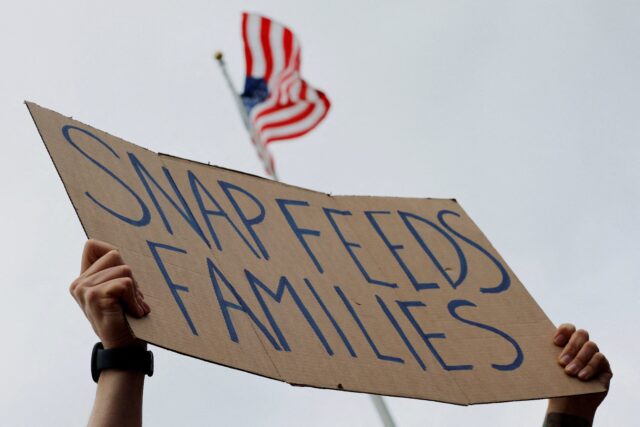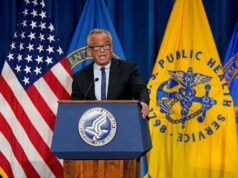
WASHINGTON — The U.S. Supreme Court has moved to temporarily block full payments necessary to fund SNAP, a program providing food support to millions of Americans with low incomes, after the Trump administration asked the court to hear its request to issue only partial payments in November.
The administration filed with the Supreme Court after a federal appeals court declined to suspend a district judge’s order demanding the administration fully fund the latest installment by Nov. 7.
The developments mark the latest in a legal battle over funding SNAP — the Supplemental Nutrition Assistance Program, a major part of the nation’s social safety net — amid the longest government shutdown in the nation’s history.
Solicitor General D. John Sauer had asked the nation’s highest court for “an immediate administrative stay” by 9:30 p.m. Nov. 7 on a lower court order to pay the benefits in full that same day.
Hours earlier, the 1st U.S. Circuit Court of Appeals had denied the administration’s request for a stay pending appeal of the court’s Nov. 6 order to fund the November SNAP benefits, which were scheduled to lapse Nov. 1. The court said the “pending appeal remains pending, and we intend to issue a decision on that motion as quickly as possible.”
In its Supreme Court filing, the Trump administration claimed that the lower court had “demanded” that the U.S. Department of Agriculture — which administers the federally funded program through the states — “find some, any, way to fund SNAP, treating the program essentially as a mandatory entitlement,” rather than a program “subject to available appropriations.”
On Oct. 31, Judge Jack McConnell of the U.S. District Court for the District of Rhode Island had said USDA must distribute the contingency funds “timely, or as soon as possible, for the November 1 payments to be made.” The Trump administration said in response it would issue partial payments.
But on Nov. 6, McConnell said the Trump administration must issue full payments.
“The defendants failed to consider the practical consequences associated with this decision to only partially fund SNAP,” McConnell said in a ruling from the bench. “They knew that there would be a long delay in paying partial SNAP payments and failed to consider the harms individuals who rely on those benefits would suffer.”
The USDA has said it is unable to draw from its contingency fund — about $6 billion — to meet the more than $8 billion needed for SNAP funding in November, a move Democratic lawmakers have urged amid a stalemate with their Republican counterparts over health care funding in the stalled budget.
However, there is precedent for funding SNAP during shutdowns. During a lengthy government shutdown during the first Trump administration, the USDA authorized early processing of SNAP funds to ensure there would be no disruption in service, The Huffington Post noted.
Some states — including California, Hawaii, Kansas, New Jersey, Oregon, Pennsylvania, Washington state and Wisconsin — quickly filed for the SNAP funds after the lower court order, and were able to provide this form of social support to people via their electronic benefit transfer (EBT) accounts.
However, Trump administration officials ordered states to “immediately undo” full SNAP payments, and warned of financial penalties if states failed to comply.
“To the extent States sent full SNAP payment files for November 2025, this was unauthorized,” the USDA said in a Nov. 8 memorandum. “Accordingly, States must immediately undo any steps taken to issue full SNAP benefits for November 2025.”
Qualified SNAP recipients — low-income families, seniors and persons with disabilities living on fixed incomes — receive monthly allowances through such accounts, with SNAP EBT cards used like debit or credit cards to purchase essential foods and seeds to grow food. Sales tax, takeaway and pet foods, nonfood items, alcohol, tobacco, vitamins and medicine are excluded.
SNAP — which originated as a food stamp project launched in 1939, and which was expanded through various legislative acts across multiple presidential administrations — served on average 41.7 million people per month, or 12.5% of the nation’s residents, in fiscal year 2024, according to the USDA.
A substantial number of Catholic households in the U.S. are also vulnerable to food insecurity. Updated Pew Research data released in 2025 found 36% of Catholic households make under $50,000, including 18% making under $30,000.
The federal poverty line for a family of four in the U.S. is $32,150 in 2025.
The Catholic Church holds in its social doctrine that all human beings have the right to food as part of their right to life.

In the 1963 encyclical “Pacem in Terris” (“Peace on Earth”), St. John XXIII stated, “Every man has the right to life, to bodily integrity, and to the means which are suitable for the proper development of life; these are primarily food, clothing, shelter, rest, medical care, and finally the necessary social services.”
With 1 in 8 Americans relying on SNAP, Catholic Charities USA announced on Oct. 30 a national fundraising effort to provide an emergency supply of food to Catholic Charities agencies around the country.
All funds raised through the initiative are used to buy and ship food directly to its partner agencies around the country that operate food pantries, soup kitchens, food delivery programs and other efforts to serve those facing hunger or food insecurity.
“For low-income families and individuals who rely on SNAP and WIC to put food on their tables, this could be a catastrophic moment,” Kerry Alys Robinson, CCUSA president and CEO, said in a statement at the time, adding the network “stands ready to come to the aid of our vulnerable brothers and sisters during this time of dire need.”












